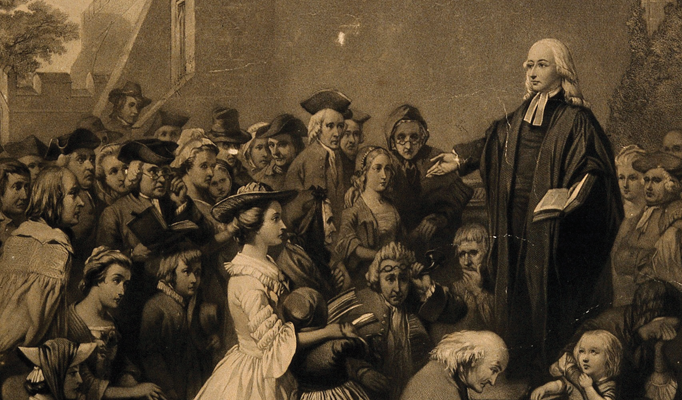
In the early 1700s, after General James Oglethorpe rescued 10,000 people from Debtors Prison, he recruited John & Charles Wesley to serve these ex-debtors as Anglican priests in the new colony of Savanah, Georgia.
The Wesleys were Oxford University academics with little pastoral experience. When they arrived in Georgia, they encountered one disaster after another.
One time when the Wesleys put the only doctor in Savannah in jail for getting drunk, a woman died in childbirth. Another time John Wesley refused communion to Sophia Hopkey, his ex-girlfriend who had married another man. After being sued for one thousand pounds for character defamation and challenged to a duel, John Wesley had to escape in the middle of the night.
John famously said: “I went to America to convert the natives. But who will convert me?”
During a violent storm while returning by boat to England, he was impressed by the calm faith of the Moravian Brethren. Attending their London chapel, his heart was strangely warmed. He began preaching outside, covering many miles on horseback. Many in England were angry with him; he was barred from preaching in many parish churches. Sometimes his opponents attacked Wesley, calling for his crucifixion, but he was undeterred and didn’t let anything stop him.
Some historians credit the Wesleys with having prevented the French Revolution from happening in 18th century England, because Methodist revival peacefully improved the lot of the working class. At that time, adults and even children could be legally hanged for 160 different offenses – from picking a pocket to stealing a rabbit. In London, 75 percent of all children died before age five. Among the poor, the death rate was even higher. In one orphanage, only one of 500 orphans survived more than a year. Alcohol abuse was rampant, even among children, with over 11 million gallons of gin consumed in 1750.
Charles and John Wesley believed that changed hearts could lead to a changed society. By setting many free from alcoholism and teaching children to read, Methodism gave parents hope for a better life for their families.
In 1925 Canadian Methodists joined three other denominations (the Congrational Union of Canada, the Presbyterian Church of Canada and the much smaller General Council of Union Chruches) to bring about the birth of the United Church of Canada. Today few Canadians hear much about Methodism, which was once an Anglican renewal movement that transformed Canada. Methodists were well known for their summer Camp Meeting revivals, weekly class meetings (ie home groups), and vigorous hymn singing.
Suspected of being disloyal after the War of 1812, Canadian Methodists over time became the quintessential Canadians. Both sides of our families had Methodist circuit rider preachers. On Janice’s side, her Methodist ancestors were named John Wesley Cline and Charles Wesley Cline.
The most famous Canadian Methodist, Egerton Ryerson, helped create free Canadian public schools rooted in Judeo-Christian values at a time when less than half the children were attending school.
Ryerson, the founding editor of The Christian Guardian, the first Canadian Christian newspaper, advocated that education “should be as common as water and as free as air. Education among the people is the best security of a good government and constitutional liberty…The first object of a wise government should be the education of the people.”
We are all indebted to the Wesley brothers who brought Methodist revival to Canada.

Great and informative post, of the forefathers of Methodism. Brave and forthrightness was their mantle it seems.